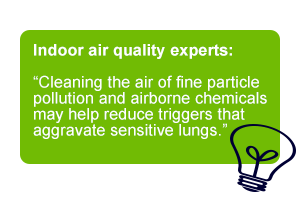- Home
- Shop
- Replacement Filters
- Commercial
- About Us
- Learn More
- Contact Us
- Clean Air News
- Home
- Shop +
- Replacement Filters
- Commercial +
- About Us +
- Learn More +
- Contact Us
- Clean Air News
- Sign in
- 1-888-852-8247 or 514-335-4277

It's probably telling that the word ‘fracking’ sounds just shy of a curse word. Researchers at the Johns Hopkins Bloomberg School of Public Health have found that people who live near active, unconventional natural gas wells operated by the fracking industry were significantly more likely to suffer from asthma attacks. It’s the latest in a string of studies that has linked the fracking industry to health issues including lower birth weights, skin problems and upper respiratory issues.

“Ours is the first to look at asthma but we now have several studies suggesting adverse health outcomes related to the drilling of unconventional natural gas wells,” says study leader Sara G. Rasmussen. “Going forward, we need to focus on the exact reasons why these things are happening, because if we know why, we can help make the industry safer.”
For the study, the researchers looked at health records from 40 counties in Pennsylvania. The fracking industry has developed more than 9,000 wells in that state in just the past 10 years. The Hopkins researchers identified more than 35,000 asthma patients between the ages of five and 90 years. They mapped where the patients with asthma attacks lived and crossed that with stats like the location, size, number, phase, total depth and gas production of the wells. They compared those maps to asthma patients who didn’t have attacks in the same year.
The findings were telling. Researchers say those who lived closer to either a large number of wells or bigger wells were 1.5 to four times more likely to suffer asthma attacks. They also add that their findings held up even when they accounted for traditional risk factors like major roads, family history, economic status and smoking.
“Going forward, everyone can learn from Pennsylvania’s experience,” says study senior author, Brian S. Schwartz. “State regulatory bodies should use the growing number of health studies to understand the possible environmental and public health impacts of this industry and how to minimize them.”
 Study authors say they don’t yet know what causes the increase, but a variety of factors including things like air pollution, increased truck traffic, and increased stress levels from the noise could play a role. They suggest seeking immediate treatment symptoms of an asthma attack occur and avoiding odors and the outdoors when air pollution may be worse.
Study authors say they don’t yet know what causes the increase, but a variety of factors including things like air pollution, increased truck traffic, and increased stress levels from the noise could play a role. They suggest seeking immediate treatment symptoms of an asthma attack occur and avoiding odors and the outdoors when air pollution may be worse.
The study was published in JAMA Internal Medicine.
Source: Press Release, Johns Hopkins Bloomberg School of Public Health

The Los Angeles Wildfires that swept through Southern California, The Palisades Fire in Pacific Palisades and Eaton Fire in Altadena are one of the worst natural disasters in California history.

